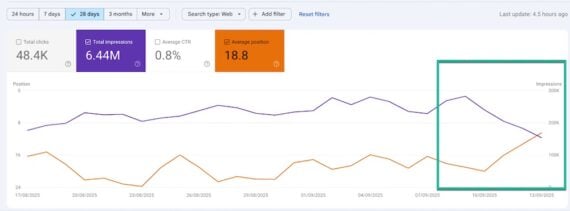Google’s default search results list 10 organic listings per page. Yet adding &num=100 to the search result URL will show 100 listings, not 10 — until now.
This week, Google dropped support for the &num=100 parameter. It’s a telling move. Many search pros speculate the aim is to restrict AI bots that use the parameter to perform so-called fan-out searches. The collateral damage is to search engine ranking tools, which have long used the parameter to scrape results for keywords. Many of those tools no longer function, at least for now.
Surprisingly, the move affected Performance data in Search Console. Most websites now see increases in average positions and declines in the number of impressions.

In Search Console, most website owners now see increases in average positions and declines in the number of impressions. Click image to enlarge.
Search Console
Google has provided no explanation. Presumably the changes in Performance data are owing to traffic from the third-party bots, not humans. That is the unexpected huge takeaway: Search Console data at least partially includes bot activity.
In other words, the lost “Impressions” were URLs as shown to both bot scrapers and human searchers. The “Average Position” metric is closely tied to “Impressions,” as Search Console records the topmost position of a URL as seen by searchers. Impressions now decline if “searchers” are bots.
Thus organic performance data in Search Console is now more human impressions and fewer bots. The data reflects actual consumers viewing the listings.
The data remains skewed for top-ranking URLs because page 1 of search results is still accessible to bots, although I know of no way to quantify bot searches versus those of humans.
Adios Rank Tracking?
Search result scrapers require much computing time and energy. Third-party tools will likely raise their prices as, from now on, their bots must “click” to the next page nine times to reach 100 listings.
Tim Soulo, CMO of Ahrefs, a top SEO platform, hinted today on LinkedIn that the tool would likely report rankings on only the first two pages to remain financially sustainable.
So the future of SEO rank tracking is unclear. Likely, tracking organic search positions will become more expensive and produce fewer results (only the top two pages).
What to Do?
- Monitor your organic performance as reported by Search Console.
- Wait for the Performance section in Search Console to stabilize
- Consider SEO platforms that integrate with Search Console. For example, SEO Testing allows customers to import and archive the Performance data and annotate industry updates (such as Google’s &num=100 move) for traffic or rankings impact.
Rank tracking may become obsolete, but monitoring organic search positions remains essential for keyword gap analysis and content ideas, among other SEO tasks.




